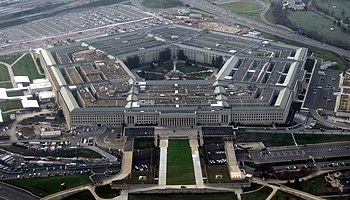
“The White House said Tuesday [June 7] that President Barack Obama will veto the Senate’s version of the annual defense policy bill,” Richard Lardner of the Associated Press reports. Why? Lardner cites provisions that would prevent Obama from shutting down the prison at Guantanamo Bay and limit the number of “national security” functionaries he can put on the White House payroll.
Deeper in the story, however, we find meatier objections: The $600 billion bill “denies the Defense Department’s request for a new round of military base closings” and Senate Armed Service Committee chairman John McCain (R-AZ) “plans to propose an amendment that would add nearly $18 billion to the defense budget to pay for additional ships, jet fighters, helicopters and more that the Pentagon didn’t request.”
If Obama, who doesn’t face re-election, follows through on his veto threat House and Senate Democrats will likely join Republicans in overriding that veto so long as they get their share of that $18 billion and the bases in their districts remain open. What gives? Nothing. It’s politics as usual.
In the Declaration of Independence, Thomas Jefferson asserted that the purpose of government is to secure the rights of the governed to life, liberty and the pursuit of happiness.
Jefferson, to put the best face possible on things, was hopelessly naive. The purpose of government is — and always has been — to transfer wealth and power from the ruled to the rulers. Politicians crave unearned power; plutocrats crave unearned profit. The two groups, broadly constituting the “political class,” prop each other up and assist each other in milking the rest of us.
Since World War 2, the premier American political milking operation of this type has been what President Dwight D. Eisenhower labeled “the military-industrial complex.” Politicians receive campaign contributions and golden parachutes as corporate directors. In return, “defense” contractors knock down billions in arms sales, base maintenance contracts, etc. All at your expense, and none of it related to any reasonable conception of “national defense.”
It’s not just treasure the political class takes from the productive class. It’s blood as well. Justifying insane levels of military spending requires the occasional war. Not to worry. The political class considers your sons’ and daughters’ lives a reasonable price to pay to keep their gravy trains running on time.
Don’t expect anything different from this year’s crop of presidential candidates. Donald Trump believes the bloated US military needs to be “rebuilt.” Hillary Clinton hasn’t met a war she didn’t love since Vietnam. Even “libertarian” vice-presidential candidate William Weld, running on a second Republican ticket, avers that he and running mate Gary Johnson believe “a bedrock responsibility of the US government is to maintain the most powerful military in the world, by a wide margin.” Given that the US is separated from all credible military threats by two oceans, Weld’s line is clearly the usual political class pandering.
If voting won’t fix the problem this November, what next? Well, the National War Tax Resistance Coordinating Committee (nwtrcc.org) has some ideas for next April.
Thomas L. Knapp (Twitter: @thomaslknapp) is director and senior news analyst at the William Lloyd Garrison Center for Libertarian Advocacy Journalism (thegarrisoncenter.org). He lives and works in north central Florida.
PUBLICATION/CITATION HISTORY
- “Got Milked? US ‘Defense’ Spending 2017,” by Thomas L. Knapp, OpEdNews, 06/09/16
- “Got Milked? US ‘Defense’ Spending 2017,” by Thomas L. Knapp, Antiwar.com, 06/09/16
- “Got Milked? US ‘Defense’ Spending 2017,” by Thomas L. Knapp, CounterPunch, 06/10/16
- “Got Milked? US ‘Defense’ Spending 2017,” by Thomas L. Knapp, Key West: The Newspaper, 06/10/16
- “Got Milked? US ‘Defense’ Spending 2017,” by Thomas L. Knapp, Ventura County, California, Citizens Journal, 06/11/16
- “Got Milked? US ‘Defense’ Spending 2017,” by Thomas L. Knapp, Uintah Basin, Utah Standard, 06/14/16
- “Got milked? US ‘defense’ spending 2017,” by Thomas L. Knapp, Winnemucca, Nevada News 4 Nevada, 06/17/16


